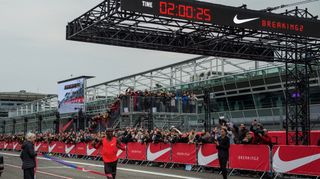Six Things Every Runner Can Learn From Nike’s Breaking2 Two-Hour Marathon Attempt
You’re not going to match Eliud Kipchoge’s time, but you can steal tips from his training

Even though none of the trio managed to break the two-hour barrier, history was made when Eliud Kipchoge, Zersenay Tadese and Lelisa Desisa ran a marathon as part of Nike’s Breaking2 programme.
Kipchoge completed the 42.2km course in 2hr 0min 25sec, a massive 2min 32sec faster than the current world record and 2min 40sec better than his own personal best of 2hr 3min 5sec. Although those records won’t count, because the event didn’t qualify as an official attempt under International Association of Athletics Federations (IAAF) regulations, it was still a stunning effort.
The trio of athletes had access the best tech, nutrition and coaching in their bid to break two hours. Although most of it is out of reach of the average pavement pounder, there are things you can learn from Nike’s Breaking2 programme that will improve your running.
RECOMMENDED: 14-Week Marathon Training Plans For Everyone
Eat Nitrate-Rich Food Like Spinach, Beetroot, Rocket And Lettuce
Andrew Jones, professor of applied physiology at the University of Exeter and special advisor (endurance) for the English Institute of Sport, was the man Nike asked to provide training and nutrition advice for the three athletes. In an interview with The Guardian he revealed some of tips he gives athletes, starting with a recommendation to increase your intake of nitrate-rich food.
When Jones visited athletes in Kenya he noticed they ate a lot of nitrate-rich stewed spinach – which is why he’s become the man responsible for the beetroot revolution in sports. The high amount of nitrates in the purple vegetable can result in performance boosts for athletes at all levels. Along with beetroot and spinach, other good sources of nitrates include rocket and lettuce.
RECOMMENDED: It’s Official – Beetroot Juice Can Improve Your Endurance
Get the Coach Newsletter
Sign up for workout ideas, training advice, reviews of the latest gear and more.
Refuel Little And Often
If you’ve ever run a marathon you’ve probably already been introduced to the joys of trying to refuel while on the go using carb gels, electrolyte drinks and water. A standard strategy is to take on a carbohydrate running gel and fluids every 5K or so, but during the Breaking2 attempt the runners took on fluids every 2.4km. Taking on smaller amounts of carbs and electrolytes more often makes it easier for the body to absorb them.
Don’t Be Afraid To Push The Pace On Long Runs
Your longest training runs are generally a minute or so slower per kilometre than the pace you’ll actually run on race day. According to Jones this differs from the strategy of elite African athletes, who will start long runs slowly but pick up the pace throughout the run. It will help you get used to the requirements of maintaining your race pace.
Join A Group Of Runners On Race Day
You almost certainly won’t be able to use the flying goose formation of pacers that shielded the Nike athletes from the wind during the Breaking2 run, but most mass-participation events have enough people to allow you to find a group to run with (or just behind) at your preferred pace.
Take Caffeine Towards The End Of A Run
A performance-enhancing supplement that’s entirely legal and available to all, caffeine – taken before a big run and then in the final half-hour – can provided a much-needed boost. According to Jones, all three of the Breaking2 athletes adopted this strategy. You can get carb gels and electrolyte drinks that also contain caffeine to take during a race, as well as caffeine shots from SiS, if chugging a Coke or a coffee mid-run doesn’t sound appealing.
Save Your Best Efforts For Race Day
After Kipchoge, Tadese and Desisa chased the two-hour dream at Monza, Wired journalist Ed Caesar attempted to break 90 minutes for a half-marathon for the first time on the same course. As an amateur athlete embedded with the Breaking2 project, Caesar was given a unique chance to see what runners in his position can learn from the elites. One of the things he learned was that they took their recovery runs very seriously and slowed their pace dramatically. Furthermore, they saved their all-out efforts for race day, resisting the temptation to push too hard during training.
“The time to open up a can of whup-ass is on race day,” Valentijn Trouw, Kipchoge’s manager, told Caesar. “Otherwise, you risk leaving your best performance in training, where nobody sees it.”
RECOMMENDED: UK Marathons To Sign Up For

Nick Harris-Fry is a journalist who has been covering health and fitness since 2015. Nick is an avid runner, covering 70-110km a week, which gives him ample opportunity to test a wide range of running shoes and running gear. He is also the chief tester for fitness trackers and running watches, treadmills and exercise bikes, and workout headphones.
